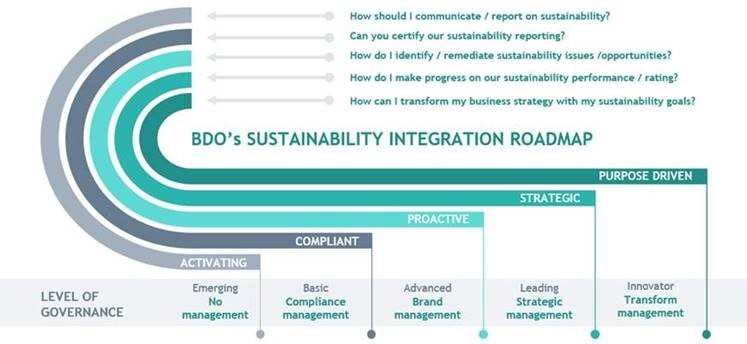In the modern business landscape, consumers are increasingly demanding transparency on sustainable business practices. As a result, companies are putting a greater emphasis on their environmental, social and governance (ESG) initiatives.
For many organisations, this can seem daunting. With ‘sustainability’ encapsulating so many facets, it can be difficult to know where to start. In fact, in a recent BDO webinar, 70% of poll respondents said they had not started or produced their first sustainability report. We break down the process to help you determine how to measure ESG initiatives for your sustainability reporting.
What level of ESG integration should a business aim for?
The sustainability environment that surrounds each organisation is different - from the industry nuances, the regulations and legislations shaping that industry, market factors and consumer behaviours, and even the existing processes and policies within the business. With this myriad of internal and external factors shaping both the ESG opportunities available and the organisation’s appetite to address them, there’s no ‘one size fits all’ approach.
To establish which sustainability practices to monitor and measure, boards and leaders should first look to determine the role they want ESG to play in their organisation. This will help guide the initiatives the organisation chooses to pursue, and in turn help to determine the metrics available for measuring progress. By taking a holistic view, organisations have a more realistic approach to what level of ESG maturity is achievable.
How do you determine the ‘right’ level of ESG maturity?
BDO’s Sustainability Integration Roadmap identifies five levels of ESG maturity across organisations (see below). Leaders should identify the maturity level that suits the needs and particular business appetite, and create a plan for their evolution.
- Activating - In this first stage, companies are considering the risks and opportunities in activating their sustainability agenda.
- Compliant - These companies have sustainability initiatives in place, but only to respond to regulatory or stakeholder requirements.
- Proactive - Proactive companies take a holistic approach to sustainability, thinking beyond what’s required by law and looking at potential value generation opportunities.
- Strategic - Sustainability is embedded across most parts of the business with a focus on having a positive impact in its chosen markets.
- Purpose-driven - These companies use a lens of environmental, social and governance criteria across the entire business strategy, ensuring an innovative, purpose-led culture.

These ESG levels can also act as much as transition phases, as a final state. For example, an organisation that chooses to ultimately adopt a strategic approach to sustainability, will most like transition through the activating, compliant and proactive levels as it develops its appropriate governance, strategy, risk management and measurement/reporting systems.
What can be measured, can be managed
Once the initiatives have been mapped out, it is easier to identify the metrics available to measure a baseline for each initiative. Organisations can then create short- and long-term plans to address the sustainability measures, and should commit to re-measuring periodically to establish their progress.
While there might be applicable local regulations or legislation, there is no boilerplate list of metrics or disclosures that each business should report on. The International Sustainability Standards Board (ISSB) has published exposure drafts on the general requirements for sustainability-related financial disclosures (IFRS S1) and climate-related disclosures (IFRS S2). The exposure drafts suggest every business needs to determine fit-for-purpose metrics to reflect their business strategy, while also disclosing how they define the metrics, where the data comes from, the methods for the calculations and whether the metrics are validated by a third party.
Depending on the issues that are important to an organisation and its stakeholders, some common ESG measures include:
- Environment
- Carbon footprint – direct (scope 1), indirect (scope 2) and third party (scope 3) emissions.
- Energy efficiency – energy ratings of your buildings and facilities.
- Waste management – volume of landfill or waste diverted from landfill, volume of recycled materials.
- Social
- Health and safety – lost time to injury (LTI) or lost time to injury frequency (LTIF) rates.
- Employee engagement – culture survey responses, retention rates.
- Customer satisfaction – Net promoter scores or customer experience (CX) initiatives.
- Diversity, equity and inclusion – gender reporting, LGBTIQA+ inclusion, disability inclusion.
- Community support and engagement – volunteer time, donations and First Nations engagement.
- Governance
- Board composition – age, tenure, gender, background.
- Business ethics – breaches and fines, training rates.
- Data protection – training rates for privacy, ISO certifications.
- Governance – ESG committee responsibilities, executive remuneration and links to ESG performance.
- Modern slavery – risk rating tools for procurement.
No matter your organisation’s level of ESG maturity, it should have a rationale behind its positioning. A stated approach to how you will achieve your goals and commitments will help to formulate a roadmap to sustainability success. Think about the level of assurance you’re getting, the metrics you want to be capturing and the ESG frameworks with which you may need to comply.
Here to help
If you’d like support to identify and measure the right ESG initiatives for your organisation, contact a BDO sustainability expert today.
Sustainability webinar series
If your organisation is looking to improve their sustainability practices, and you’re not sure where to start, join our interactive sustainability webinar series to gain a better understanding of the process. From breaking down the fundamentals, to driving change, this free series can help at any stage of your journey.